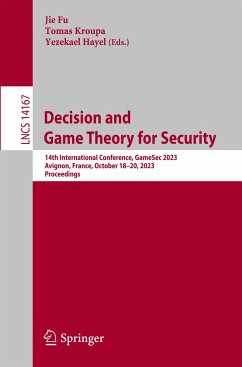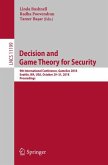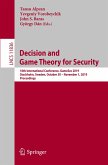Decision and Game Theory for Security
14th International Conference, GameSec 2023, Avignon, France, October 18-20, 2023, Proceedings
Herausgegeben:Fu, Jie; Kroupa, Tomas; Hayel, Yezekael
Decision and Game Theory for Security
14th International Conference, GameSec 2023, Avignon, France, October 18-20, 2023, Proceedings
Herausgegeben:Fu, Jie; Kroupa, Tomas; Hayel, Yezekael
- Broschiertes Buch
- Merkliste
- Auf die Merkliste
- Bewerten Bewerten
- Teilen
- Produkt teilen
- Produkterinnerung
- Produkterinnerung
This book constitutes the refereed proceedings of the 14th International Conference on Decision and Game Theory for Security, GameSec 2023, held in Avignon, France, during October 18-20, 2023. The 19 full papers and 4 short papers included in this book were carefully reviewed and selected from 33 submissions. They were organized in topical sections as follows: Mechanism design and imperfect information, Security Games, Learning in security games, Cyber deception, Economics of security, Information and privacy and Short articles.
Andere Kunden interessierten sich auch für
![Decision and Game Theory for Security Decision and Game Theory for Security]() Decision and Game Theory for Security38,99 €
Decision and Game Theory for Security38,99 €![Decision and Game Theory for Security Decision and Game Theory for Security]() Decision and Game Theory for Security38,99 €
Decision and Game Theory for Security38,99 €![Critical Infrastructure Protection XI Critical Infrastructure Protection XI]() Critical Infrastructure Protection XI38,99 €
Critical Infrastructure Protection XI38,99 €![Critical Infrastructure Protection XI Critical Infrastructure Protection XI]() Critical Infrastructure Protection XI38,99 €
Critical Infrastructure Protection XI38,99 €![Critical Infrastructure Protection X Critical Infrastructure Protection X]() Critical Infrastructure Protection X38,99 €
Critical Infrastructure Protection X38,99 €![Critical Infrastructure Protection X Critical Infrastructure Protection X]() Critical Infrastructure Protection X38,99 €
Critical Infrastructure Protection X38,99 €![Critical Infrastructure Protection IX Critical Infrastructure Protection IX]() Critical Infrastructure Protection IX38,99 €
Critical Infrastructure Protection IX38,99 €-
-
-
This book constitutes the refereed proceedings of the 14th International Conference on Decision and Game Theory for Security, GameSec 2023, held in Avignon, France, during October 18-20, 2023.
The 19 full papers and 4 short papers included in this book were carefully reviewed and selected from 33 submissions. They were organized in topical sections as follows: Mechanism design and imperfect information, Security Games, Learning in security games, Cyber deception, Economics of security, Information and privacy and Short articles.
The 19 full papers and 4 short papers included in this book were carefully reviewed and selected from 33 submissions. They were organized in topical sections as follows: Mechanism design and imperfect information, Security Games, Learning in security games, Cyber deception, Economics of security, Information and privacy and Short articles.
Produktdetails
- Produktdetails
- Lecture Notes in Computer Science 14167
- Verlag: Springer / Springer Nature Switzerland / Springer, Berlin
- Artikelnr. des Verlages: 978-3-031-50669-7
- 1st ed. 2023
- Seitenzahl: 420
- Erscheinungstermin: 29. Dezember 2023
- Englisch
- Abmessung: 235mm x 155mm x 23mm
- Gewicht: 633g
- ISBN-13: 9783031506697
- ISBN-10: 3031506693
- Artikelnr.: 69440690
- Herstellerkennzeichnung
- Springer-Verlag KG
- Sachsenplatz 4-6
- 1201 Wien, AT
- ProductSafety@springernature.com
- Lecture Notes in Computer Science 14167
- Verlag: Springer / Springer Nature Switzerland / Springer, Berlin
- Artikelnr. des Verlages: 978-3-031-50669-7
- 1st ed. 2023
- Seitenzahl: 420
- Erscheinungstermin: 29. Dezember 2023
- Englisch
- Abmessung: 235mm x 155mm x 23mm
- Gewicht: 633g
- ISBN-13: 9783031506697
- ISBN-10: 3031506693
- Artikelnr.: 69440690
- Herstellerkennzeichnung
- Springer-Verlag KG
- Sachsenplatz 4-6
- 1201 Wien, AT
- ProductSafety@springernature.com
Mechanism design and imperfect information.- Observable Perfect Equilibrium.- Playing Repeated Coopetitive Polymatrix Games with Small Manipulation Cost.- Rule Enforcing Through Ordering.- Security Games.- Multi-defender Security Games with Schedules.- Asymmetric Centrality Game against Network Epidemic Propagation.- Shades of Grey: Strategic Bimatrix Stopping Games for Modelling (Un)Ethical Hacking Roles.- Learning in security games.- Characterizing and Improving the Robustness of Predict-Then-Optimize Frameworks.- Quantisation Effects in Adversarial Cyber-Physical GamesTakuma Adams.- Scalable Learning of Intrusion Responses through Recursive Decomposition.- Cyber deception.- Honeypot Allocation for Cyber Deception in Dynamic Tactical Networks: A Game Theoretic Approach.- Optimal Resource Allocation for Proactive Defense with Deception in Probabilistic Attack Graphs.- The Credential is Not Enough: Combining Honeypots and Fake Credentials for Cyber-Defense.- Economics of security.- Does Cyber-insurance Benefit the Insured or the Attacker? -- A Game of Cyber-Insurance.- Rational Broadcast Protocols against Timid Adversaries.- FlipPath Game to Counter Stealthy Attacks in SDN-based Tactical Networks.- Information and privacy.- Double-sided Information Asymmetry in Double Extortion Ransomware.- Opacity-enforcing active perception and control against eavesdropping attacks.- A Game-Theoretic Analysis of Auditing Differentially Private Algorithms with Epistemically Disparate Herd.- Modeling and Analysis of a Nonlinear Security Game with Mixed Armament.- Short articles.- Incentive-Based Software Security: Fair Micro-Payments for Writing Secure Code.- Using Game Theory Approach for COVID-19 Risk Analysis and Medical Resource Allocation.- Shapley Value to Rank Vulnerabilities on Attack Graphs: Applications to Cyberdeception.- Solving security models with perfect observability.
Mechanism design and imperfect information.- Observable Perfect Equilibrium.- Playing Repeated Coopetitive Polymatrix Games with Small Manipulation Cost.- Rule Enforcing Through Ordering.- Security Games.- Multi-defender Security Games with Schedules.- Asymmetric Centrality Game against Network Epidemic Propagation.- Shades of Grey: Strategic Bimatrix Stopping Games for Modelling (Un)Ethical Hacking Roles.- Learning in security games.- Characterizing and Improving the Robustness of Predict-Then-Optimize Frameworks.- Quantisation Effects in Adversarial Cyber-Physical GamesTakuma Adams.- Scalable Learning of Intrusion Responses through Recursive Decomposition.- Cyber deception.- Honeypot Allocation for Cyber Deception in Dynamic Tactical Networks: A Game Theoretic Approach.- Optimal Resource Allocation for Proactive Defense with Deception in Probabilistic Attack Graphs.- The Credential is Not Enough: Combining Honeypots and Fake Credentials for Cyber-Defense.- Economics of security.- Does Cyber-insurance Benefit the Insured or the Attacker? -- A Game of Cyber-Insurance.- Rational Broadcast Protocols against Timid Adversaries.- FlipPath Game to Counter Stealthy Attacks in SDN-based Tactical Networks.- Information and privacy.- Double-sided Information Asymmetry in Double Extortion Ransomware.- Opacity-enforcing active perception and control against eavesdropping attacks.- A Game-Theoretic Analysis of Auditing Differentially Private Algorithms with Epistemically Disparate Herd.- Modeling and Analysis of a Nonlinear Security Game with Mixed Armament.- Short articles.- Incentive-Based Software Security: Fair Micro-Payments for Writing Secure Code.- Using Game Theory Approach for COVID-19 Risk Analysis and Medical Resource Allocation.- Shapley Value to Rank Vulnerabilities on Attack Graphs: Applications to Cyberdeception.- Solving security models with perfect observability.








